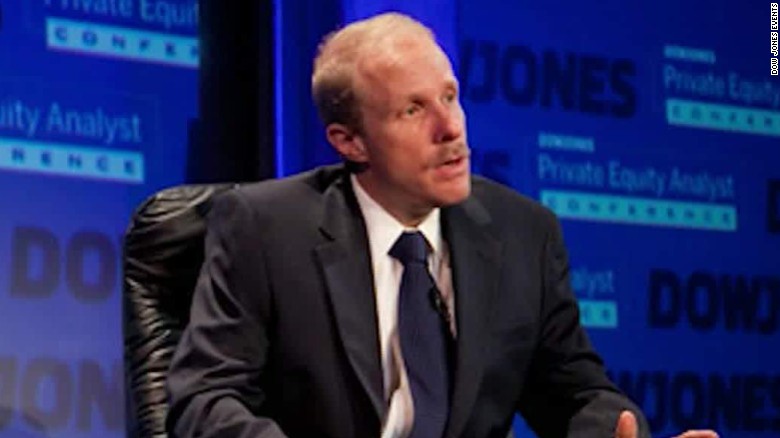by David Isenberg
According to a July 10 New York Times article, Steve Bannon has relied on advice from Erik Prince, co-founder of storied private security firm Blackwater, and Stephen A. Feinberg, a private equity billionaire financier who owns the giant military contractor DynCorp International through his investment company Cerberus Capital Management. That the Trump administration would turn to Feinberg is not that surprising. Although Feinberg himself has no direct national security or warzone contracting experience, DynCorp has been a major private contractor player in both Iraq and Afghanistan. Like the old E.F. Hutton commercial, when DynCorp talks, the governments listen.
And back in January he was being considered for a role in the Trump administration. He was also on a short list to lead a broad review of American intelligence agencies. Although neither of these appointments happened, they testify to his influence.
In fact, Feinberg is an éminence grise of the contracting world. As Tim Shorrock reported in The Nation:
Feinberg has acquired dozens of companies engaged in military and intelligence operations. As Bloomberg News reported in a detailed profile last February, “Feinberg has bought companies that refuel spy planes, train Green Berets, make sniper rifles and watch America’s foes from space. He’s handed out jobs, lobbying contracts and campaign cash to some of the most powerful people in the nation’s capital.”
Feinberg seems to have been planning for something like this for a long time. Last year it was reported that his company invested another $30 million in DynCorp International to help it expand its international presence. That money was to build up a new Global Advisory Group, which would work to pair the company’s international business executives with a group of “distinguished former government and military officials who leverage deep regional and subject-matter expertise and relationships abroad.” The move was intended “to gain access to customers that don’t know us as well, as well as supporting longstanding opportunities.”
Similarly, it’s also not surprising that the Trump administration would turn to Erik Prince, given his past support for Trump and his ties to the administration through his sister, Education Secretary Betsy DeVos.
The Times article did not lay our precisely what Prince and Feinberg are advocating, other than to state that “President Trump’s advisers recruited two businessmen who profited from military contracting to devise alternatives to the Pentagon’s plan to send thousands of additional troops to Afghanistan, reflecting the Trump administration’s struggle to define its strategy for dealing with a war now 16 years old.”
But if they don’t want to send more U.S. troops (the public sector) to Afghanistan then the alternative is relying on contractors (the private sector).
Target: Afghanistan
If one goes by Prince’s past commentary on Afghanistan, he seems to be advocating using private contractors for an explicitly counterterrorist mission with a light footprint, as opposed to the ongoing nation-building mission in which U.S. forces are engaged. In effect, contrary to Colin Powell’s famous Pottery Barn rule, Prince is happy to just keep breaking things.
If this is the case what they are advocating is both farcical and revolutionary.
First, the farcical. As Sean McFate, a former Army veteran and DynCorp contractor, and author of the book The Modern Mercenary: Private Armies and What They Mean for World Order wrote in The Atlantic:
Here’s a crazy idea floating around Washington these days, outlandish even by today’s outlandish standards: The United States should hire a mercenary army to “fix” Afghanistan, a country where we’ve been at war since 2001, spending billions along the way.
McFate can hardly be called anti-contractor. As he acknowledges:
I was a private military contractor for years. I worked mostly in Africa, where I helped stop a genocide before it started, demobilized warlords, helped UN peacekeeping missions, transacted arms deals in Eastern Europe, and raised small armies for U.S. interest. Based on my experience, I would submit that not everything Prince suggests is crazy…However, as an ex-military contractor, I cannot think of a worse solution for Afghanistan. There are many concerns about the safety, accountability, and morality of going into business with these types of outfits. When I was in the industry, I had multiple opportunities to go “off contract” and form a Praetorian Guard. In ancient Rome, this infamous imperial bodyguard assassinated 14 emperors, appointed five, and even sold the office to the highest bidder on one occasion. Praetorianism is a real thing, and something Prince or a viceroy could not easily control.
Another farcical aspect was this hilarious talking point by Trump administration court jester Sebastian Gorka:
Privatizing the war effort in Afghanistan would likely reduce some of the costs, however — a point that White House assistant Sebastian Gorka emphasized when he defended consultations with Prince in a CNN interview with Jake Tapper.
“If you look at Erik Prince’s track record, it’s not about bilking the government. It’s about the opposite,” Gorka said. “It’s about saving the US taxpayer money. It’s about creating indigenous capacity … This is a cost-cutting venture.”
Follow the Money
Whatever else one might want to say about Prince’s accomplishments in Iraq and Afghanistan saving the U.S. government money was not one of them. How do we know? None other than Erik Prince told us so, during testimony at an October 2, 2007 hearing of the U.S. House Oversight and Government Reform Committee. When asked about the cost–benefit of using private contractors, Prince responded, “I don’t know what those numbers are, sir, but that would be a great fully burden cost study that Congress could sponsor. They don’t have to do the whole thing, just take some key nodes and really study it.”
Aside from Gorka, only someone who lives on Mars or has been avoiding watching or reading the news for the past 16 years could possibly believe that private contractors have not been a major presence in Afghanistan. Considering that the total number of contractors operating in Afghanistan has, at times in the past, actually exceeded the total number of U.S. military troops and other government personnel there, the private sector has a sizable track record by which to judge its performance.
And it hasn’t measured up well at all. For example, in 2010, an audit by the Defense Contract Audit Agency found many of DynCorp International’s billing and financial controls to be “inadequate.” The private contractor that trains the Afghan police force, a U.S. military program long criticized for wasting money, failed to document millions of dollars in expenses. The Special Inspector General for Afghanistan Reconstruction, the agency devoted to tracking U.S. reconstruction efforts in Afghanistan has numerous reports mentioning DynCorp. Last year the Department of Justice sued Dyncorp, alleging that the company overcharged the State Department for support services it provided in Iraq between 2004 and 2008.
A more scholarly, but equally harsh assessment, was published by Deborah Avant, author of The Market for Force: The Consequences of Privatizing Security in The Washington Post. She wrote:
General studies of PMSCs (though not focused on counterinsurgency, per se) begin to shed light on their overall impact on war. Looking at civil wars in Africa, only when there is competition among companies do PMSCs working for government and rebels have a positive effect on civil war termination. This suggests that we may not want the unified effort Prince envisions.
Data from Iraq show that competition is not enough. Only when there is competition joined by contracts with particular performance incentives do PMSCs reduce violence in an area. And using the Private Security Database (PSD) to focus on contracts between governments and PMSCs in failed or failing states — notably applicable for Afghanistan — is shown to increase conflict severity.
More detailed studies show that PMSCs work differently than military forces and should increase our skepticism of their counterinsurgency value. Different recruitment, motivation, rules, training and flexibility all contribute to a number of well-known concerns over misbehavior by individuals, PMSCs and the governments (and other clients) that contract with them.
Although both Feinberg and Prince’s motivation for their plan reek of self-interest, Feinberg may have the bigger conflict of interest. As this New Yorker article points out:
The proposals raise obvious questions about war profiteering and conflicts of interest. DynCorp has been a bad investment for Feinberg. Buying at the tail end of the military-contracting boom of the two-thousands, Cerberus overpaid for the company, then watched as much of its business evaporated following government-spending cuts and the drawdown of U.S. troops in in Iraq and Afghanistan. In the seven years since Cerberus acquired the company, Feinberg has replaced DynCorp’s C.E.O. four times.
Afghanistan, in particular, has been a problem. In recent years, the country has proved no more hospitable to for-profit military contractors than it has to stumbling empires. DynCorp’s profit margins are thin there; revenues are falling, according to the former Cerberus insider. Several high-level managers from Cerberus portfolio companies have defected to Pacific Architects & Engineers, an upstart competitor that is taking DynCorp’s business. And DynCorp workers are often in peril. Since Cerberus acquired the company, twenty-nine DynCorp employees have been killed on the job. Most of them died in Afghanistan, including a retired U.S. Army colonel whose convoy was hit by a bomb.
Indeed, in Afghanistan, DynCorp went from farcical to the seriocomic when WikiLeaks released a 2009 State Department cable:
The week of April 13th, the DynCorp regional commander from Konduz, Flint Chambers, allowed his men to hire a 15-year-old boy dancer to do tribal dances at a DynCorp party on the training site. Some 15 or so DynCorp employees in attendance pulled out a single chair and had the boy do mock lap dances. This was captured on video. The video shows DynCorp employees putting dollar bills in the boy’s waistband, just as they would a stripper’s garter. The revelry lasted about 45 minutes.
Not Defensive
The revolutionary part of Feinberg’s and Prince’s proposal is simply that it is offensive, and not in a moral sense. Ever since the modern “private security contracting” industry emerged in the late 1980s its advocates have vehemently insisted that they are not private armies, or worse, mercenaries. Rather, they are highly corporatized and regulated entities that only engage in defensive operations—protecting their clients when they come under attack—and use only enough force to get out of harm’s way. Back when Blackwater was escorting Paul Bremer when he was the U.S. viceroy in Iraq, that was true.
And, as anyone who has ever been in the military could tell you, most private security contractors are a far cry from anything resembling an army. They don’t have the discipline, the manpower, the organization and equipment, or the institutional knowledge base.
But, now, Feinberg and Prince are saying, “Hey, forget about that, we were just kidding. We want to be all that we can be, as in a lean, green, fighting machine.”
Ironically, if you accept Prince and Feinberg at their word, that they only want to use contractors for a narrowly focused counterinsurgency campaign, they’re reinventing the wheel. The United States already has a lean, green, counterinsurgency fighting machine. It’s called JSOC (Joint Special Operations Command). Its kill count over the years has been nothing short of staggering. If the counterinsurgent campaign in Afghanistan has not been working it’s not because of lack of effort or lack of support from the private sector. Prince’s Blackwater long supported both CIA paramilitary and JSOC operations.
If their proposal were to be adopted, it is easy to see how they would benefit. The benefit to the United States in terms of achieving victory, however nebulously defined, is another matter entirely.
Photo: Stephen Feinberg (Dow Jones Events via Flickr)





